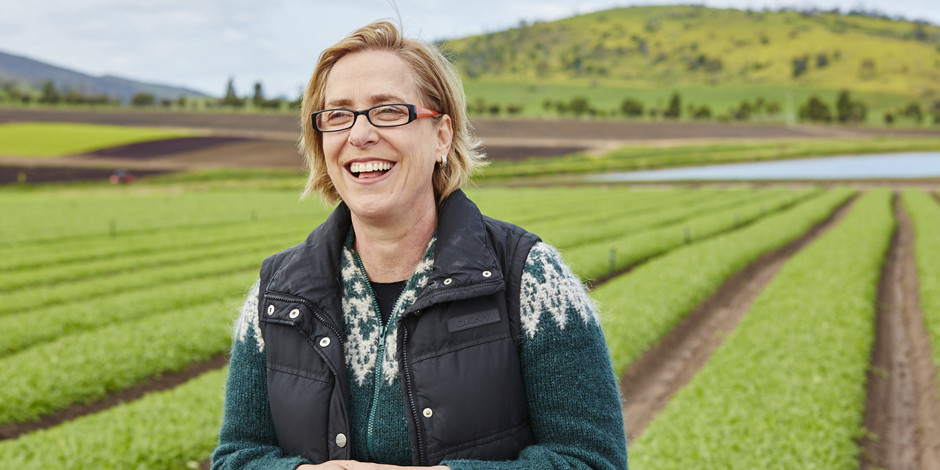Data driving profits, farms and Australia agriculture
How farmers collect, use and store data is what will drive Australian agriculture in the future, and everyone has a view on what opportunities are available.

Economist and entrepreneur, Ros Harvey, is the Founder and Managing Director of one of Australia’s most successful startups, The Yield Technology Solutions (“The Yield”). Though Ms Harvey, who was one of evokeAG.’s 2019 key speakers, prefers The Yield to be called an early stage business.
From startup to early stage business, The Yield has continued its growth of the global agtech sector with a recently finalised investment of AUD $11 million, led by venture capital group, Yamaha Motor Ventures & Laboratory Silicon Valley.
Founded in 2014, The Yield is an agtech business that harnesses the power of digital technology using Internet of Things technology to increase yields and reduce risk through the entire agrifood value chain.
The Sydney based company employs a broad range of people from engineers, data scientists, agriculturists and technologists to digitally drive the production of food by relying on increasing yield, reducing waste and on farm input costs, mitigating risk and cost associated with unpredictable weather, and improving environmental sustainability for large scale producers.
“Corporates often have large historical data sets which are critical when you are forecasting yield production, for example,” said Ms Harvey.
“Historical data needs to be ingested into our analytics and many smaller growers don’t have that depth of data – but this is changing.”
“It’s not that we don’t want to work with smaller producers, it’s simply a matter of whether or not they have the data sets that makes our solution attractive to early adopters of this kind of technology.”
The Australian success story uses data and analytics to predict the microclimate of a particular crop, which is necessary if you’re a large-scale food producer and want to know your expected yield, given the uncertainty of the weather.
“When we talk with smaller growers our key message is, make sure you keep your data. This is the fuel for machine learning and artificial intelligence. Data storage is cost efficient, and for machine learning to work, you need at least five years of data to predict things like yield.”
Named in 2018 as one of the Australian Financial Review’s 100 Women of Influence, Ms Harvey believes it’s inevitable that farming of the future will become even more data driven and it’s the way data will be rolled out which will be of interest.
“Even though the number of farms within Australia are largely family-run, 90 per cent of the value of production is by 10% per cent of growers, and what we’re seeing is that large growers often contract to smaller producers giving these smaller producers a dual track,” said Ms Harvey.
“Large corporates often have strong relationships with smaller growers in their value chains. We hope to work with these large growers to make this type of technology, including algorithms created with their data, available to their contract growers. This way everyone wins.
Ms Harvey admits that when it comes to data, the data market of the future will be innovative whatever form it takes.
“The future is data markets. This means that our customers have transparency over what is being done with their data, control over how it is used by digital providers, and incentives to share their data so that they can participate in the update side,” said Ms Harvey.
“Our strategy of working with corporates is to put data to work and we want to help others with the adoption of this as well.”
Adoption of data is as varied as the farmers who use it. Every farmer has his or her own way of collecting, using and storing data, which is both a challenge and an opportunity for famers.
Former AgriFutures Australia Horizon Scholar Jasmine Whitten is a farm business analyst with the Tamworth-based Agripath with consultants located in Chinchilla, Gunnedah and Boorowa. Jasmine is also involved in her mixed family farms at Tamworth and a beef cattle property at North Hughenden, North Queensland.
A large component of her “dream job” involves collecting and presenting farm financial and physical production data to farmers in a format that allows them to understand their business and assist them to make better business decisions.
“We build data by talking to farmers about how they’re using their land, how many paddocks they have, what they’re applying and so we build a picture of what is happening in the paddock,” said Ms Whitten.
“Farmers know all of this data off the top of their heads, they know if their yield is really bad, if their cows aren’t calving and where the gaps are in their business because they’re living and breathing it every day.”
Embracing data is not new as farmers have been doing that for a long time, she admits. What is new, is that farmers now carry numerous apps, so the question becomes how we combine all that information to chase higher production and better profits for farm businesses.
“The challenge is actually getting farmers to connect their tech and that’s when meaningful insights can be made analysing key data points,” said Ms Whitten.
Ms Whitten believes the rapid rise of Application Program Interfacing (API’S) where computers talk to other computers with the user’s permission – is inevitable.
“We’re already seeing the development of API’s going hand in hand with on-farm apps,” she said.
“The technology a farmer has will determine what data is already being collected. The data we have access too is incredibly powerful and the gap is transforming the data into something that is meaningful for the farmer,” said Ms Whitten.
“For example, a header at harvest time is collecting data like yield, fuel, grain moisture and even idle hours. That data can also be used by other programs with the farmer’s permission and processed in different ways to give different outcomes.”
That information might be used by Agripath for benchmarking or an agronomist might use it to look at precision ag technologies and how to increase yields or an accountant might incorporate it into a software package.
“The biggest challenge is initially collecting the data even if farmers don’t know how to use it today, we will use it to solve problems tomorrow.”
In a timely move, the National Farmers’ Federation (NFF) has released the first iteration of the Australian Farm Data Code (the Code), to help farmers embrace new technologies while maintaining confidence in how their data is used.
The Code is the result of collaborative efforts led by the NFF, bringing together agricultural technology providers, researchers, industry experts and farmers.
Chair of the NFF’s Farm Data Working Group, Ms Andrea Koch, said the Code fills a clear gap in the farming sector’s data governance arrangements.
“Farmers want to know how the data collected by machinery, satellites and sensors is being used, and who it’s being shared with. They also need to have some control in that process,” said Ms Koch.
Enjoyed this story? Want to learn more about the Asia Pacific region’s innovative agrifood tech ecosystem? Sign up for our newsletter here and receive fresh stories about global leaders, farmers, startups and innovators driving collaborative change.
